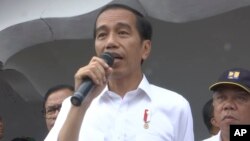Last month, the leader of a hard-line Muslim group, the Islamic Defenders Front (FPI), was hospitalized after being beaten up by the Indonesian military at his own headquarters.
Actually, nothing of the sort happened. But thousands of Indonesians still think it did, thanks to an enormously popular fake news story that circulated ahead of a mass protest in Jakarta December 2.
Several websites alleged that FPI leader Habib Rizieq, who helped organize the protest against Jakarta’s ethnic Chinese governor, was abused by the state — a provocative, albeit false, claim that roused public sentiment.
Fake news is not new in Indonesian politics, despite its ascent as a buzzword after this year’s U.S. presidential election. Blatantly false stories have circulated within the social-media-loving populace since at least 2014, when they threatened to derail the campaign of current president Joko “Jokowi” Widodo. But they have taken on a particularly inflammatory zeal in recent months, when sectarian tensions have been high because of the blasphemy trial of Jakarta governor Basuki “Ahok” Tjahaja Purnama.
This week, military General Gatot Nurmantyo stated that the fake news revealed foreign interference in Indonesian politics. It’s not clear this is the case, but it’s still striking that Indonesia’s government, which is notorious for censorship, hasn’t been able to stop the problem by just blocking problematic sites.
New Jersey, Australia, or neither?
The fake news about Habib Rizieq was traced to servers in New Jersey and Australia, Gatot told the press this week. But this isn’t necessarily evidence of meddling foreign interests.
“The Habib Rizieq story was actually a convoluted clickbait ad for an online gambling website, jitupoker.biz,” said Damar Juniarto, founder of the Digital Democracy Forum. “That site was already shut down by the Ministry of Communications, by the way. It’s a common practice of online gambling sites to use masking IP addresses from foreign countries to dodge Indonesian laws that prohibit online gambling.”
Still, said Juniarto, the story’s timing was perfect for maximum outrage: it circulated November 20, right between the two hard-line rallies in Jakarta on November 4 and December 2.
Fake news spreads particularly fast in Indonesia because its citizens are such heavy users of social media and mobile phones, said Juniarto. It proliferates not just on Facebook and Twitter, but also messaging platforms like WhatsApp.
“We can trace the explosion of fake news to the rise of social networking,” he said. “It started as a 'joke,' then it became a business, and now it’s being used as a 'political strategy.'’’
Stoking the anti-Ahok flames
“Every day on social media we find stories or memes that are proven untrue. It is really worrying, to be honest,” said Raja Juli Anthoni, a spokesperson for Ahok’s campaign.
Even the blasphemy accusation against Ahok arose, in part, from a piece of doctored media.
“This blasphemy case started when Buni Yani, a lecturer at Paramidan University, posted an edited version of Ahok’s speech quoting the Qur’an on Facebook,” said Tubaghus Ramadhan, a social media consultant who has worked on both the Jokowi 2014 and Ahok 2017 campaigns. “He included an edited transcript of his speech that made it seem like he was directly insulting the Qur’an.”
In an ironic twist, Buni Yani’s trial for circulating misinformation started the very same day as Ahok’s blasphemy trial.
Parallels to Jokowi
In a precursor to the racially charged debate around Ahok’s candidacy, current president Jokowi also faced fearmongering about his background when he ran for president in 2014. He was accused of being ethnically Chinese, a secret Christian, and a communist.
“Fake news about Jokowi’s racial, ethnic and religious background was one of the most troublesome issues we faced in the 2014 general election,” Ramadhan said.
Jokowi eventually took a highly publicized pilgrimage to Mecca to prove his Muslim credentials.
Other recent instances of fake news include allegations that a mosque was deliberately burned down by intelligence agents in the Christian province of Papua, and that Ahok drank beer at an official meeting. It was bottled mineral water.
Assigning responsibility
Following claims that fake news influenced American voters in the recent presidential election, Facebook this week announced an initiative to curb bogus content by making it easier to report and “disrupting financial incentives for spammers.”
Twitter and WhatsApp have yet to announce anti-fake-news measures of similar scale. Although these platforms should take the lead on making false stories harder to circulate, they can’t eliminate them, especially because much of the damage occurs within days or hours of their dissemination.
For its part, Indonesia’s communications ministry has blocked several fake news sites, although new ones are cheap and easy to make. The country also walks a fine line on free speech because of its record of heavy-handed censorship.
“I think we must see the fake news as a social problem, not just as a technological problem,” Juniarto said. “We must try to understand why people believe in fake news, rather than news from reputable media.”
Ahok’s campaign spokesperson, Anthoni, said their best strategy until the February election is to put out factual and positive information so voters can decide for themselves.
“We believe the only way to clarify this kind of stupidity is to give people more valid information,” he said.









